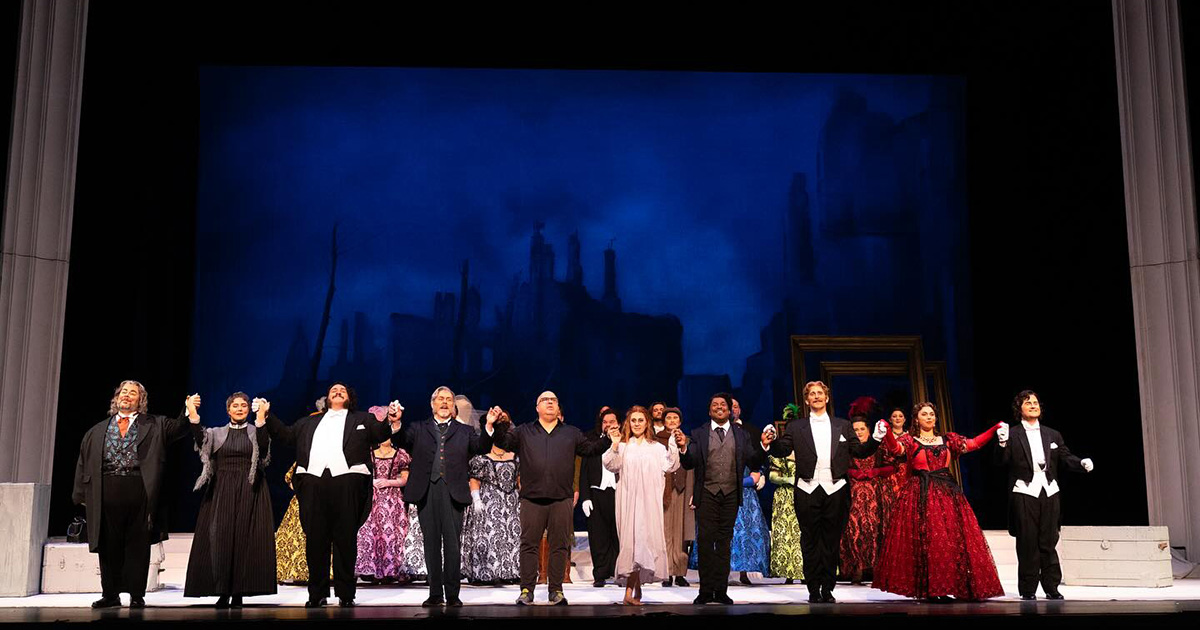Whether drawn by the popular classic tale of doomed love, by the score that is inescapably evocative, or merely by the opportunity for a romantic date night out, the audience for Knoxville Opera and its production of Verdi’s La Traviata was one of its visibly largest in recent history last Friday evening. Not surprising given the work’s assets, that audience came away charmed by the experience, many not realizing that it was with La Traviata that Knoxville Opera began its life in 1978 with Knoxville’s Mary Costa in the leading role.
Of course, sopranos who have made a name for themselves with the leading role of Violetta represent a Who’s Who of world operatic history. Recently adding to the role’s history has been soprano Anya Matanovič, who was making her Knoxville Opera debut. Ms. Matanovič covered the role at the Metropolitan Opera in 2022, having previously sung it for Opera Santa Barbara and Utah Opera. Although her dramatic character arc was skillfully presented—ranging from the courtesan of Act I, to the depth of sacrifice in Act II, to the heartbreaking pathos of the finale—it was a beautifully edged and sparkling vocal presentation that was compelling and impressive—one that had subtle surprises around every turn of phrase. The Act I combination of “Ah, fors’ è lui” and “Sempre libera” brilliantly established her character that is genuinely torn between seeking true love and enjoying pleasure without concern for the future.
Opposite Matanovič in the role of her lover, Alfredo Germont, was Chauncey Packer, also making a Knoxville Opera debut. Packer’s tenor seemed a bit unsuited to the role, although his attractive upper range almost made up for a decidedly reedy sound in the more dramatic lower range where one would expect warmth. Dramatically, Packer chose to paint his Alfredo as awe-struck and ineffectual, although there is a limit to how far one can take this approach before the suggestion of romance and passion simply lacks chemistry.

Baritone Malcolm MacKenzie was also making a Knoxville Opera debut in the role of Giorgio Germont, Alfredo’s father. Having a number of notable baritone roles under his belt, his rich experience showed. His extended scene in Act II with Violetta in which he urges her to give up Alfredo for the sake of avoiding a family scandal was the essence of restrained insistence, carried with all the rich, velvety solidity the role demands.
Stage director Keturah Stickann constructed an environment around both the settings and the secondary characters that allowed Violetta and Alfredo to either blend with, or stand apart from, the overall stage action. Mezzo-soprano Eliza Bonet has become a familiar face and voice to Knoxville audiences from recent productions of Le nozze di Figaro and Falstaff, here making a significant character construction, vocally and dramatically, for the role of Flora Bervoix, Violetta’s friend. Baritone Daniel Spiotta was a deliciously harumphing Barone Douphol, Violetta’s lover as the Act I curtain rises. Alfredo’s friend, Gastone de Letoriéres, was given a major presence by tenor John Overholt. The Marchese d’Obigny was Scott Purcell, Dr. Grenvil was Daniel Johnson-Webb, and Violetta’s maid, Annina, was Emma Louise Wilson.
Physically, Stickann’s Paris is a somewhat cold place that could easily cross over into ruin. There are frames within frames; paintings lose their luster and disappear from the frames, furniture is overturned, scrims blur details, and characters seem to sink into the background. John Horner’s lighting played into this scheme with muted colors and selective warmth and focus to sell the time, place, and psychological struggles.
Leading the Knoxville Symphony Orchestra, conductor Joseph Mechavich took a measured approach and careful tempos with the waltz-like flavors, made a little more obvious by the reduced orchestration heard here, one that was dictated by economics and the smallish Tennessee Theatre pit. Nevertheless, this was a beautifully textured preciseness, certainly a contrast to Verdi’s later, more complex orchestrated scores—like last fall’s Falstaff, for example.
Just as he had done in his pre-curtain remarks prior to Falstaff, Knoxville Opera General Director Jason Hardy once again asked for a show of hand of those seeing a KO production for the first time. And again, what looked like a majority of those in the audience raised their hands. Given the sizable audience for the Friday evening performance, this seems to suggest that there is a substantial potential audience for Knoxville Opera productions, but one that quickly becomes more discerning in what will bring them out. This will certainly be a topic later this spring as KO goes a bit off the well-worn operatic path with a non-Massenet version of the Cinderella story, Cendrillon by Pauline Viardot.








